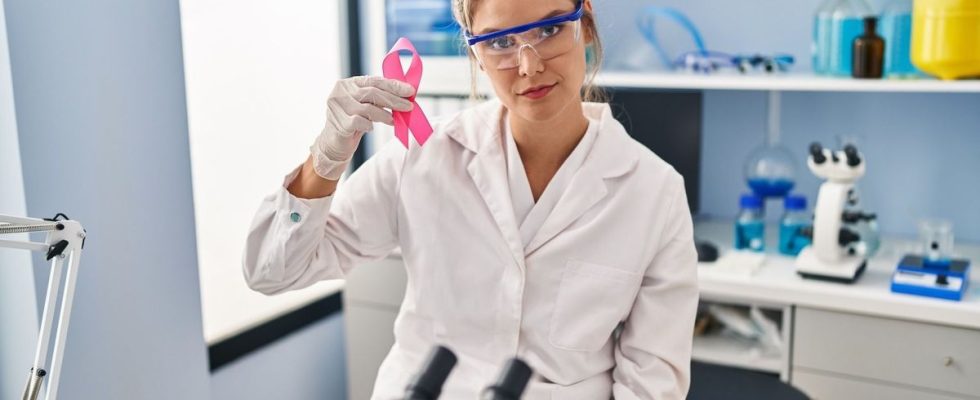Published on
Updated
Reading 3 min.
World Triple Negative Breast Cancer Day, which takes place on March 3, is an opportunity to remind people that so-called triple negative breast cancers remain the most difficult to treat and that only innovation and dynamic research can bring success. hope of curing more patients. The Institut Curie has launched several projects against this terrible cancer.
At the Institut Curie, the leading treatment center for breast cancer in Europe, several innovative trials are underway to develop new treatments and detect relapses early. These trials are part of the IHU “Women’s Cancer Institute” project founded by the Institut Curie with PSL and Inserm.
Triple negative breast cancer in a few figures
Among the 60,000 new cases of breast cancer diagnosed each year in France, triple negative breast cancer affects approximately 15% of patients, which represents 9,000 new cases detected each year.
Not sensitive to hormonal treatments or targeted anti-HER2 therapy, it is one of the most aggressive and difficult breast cancers to treat: three-quarters of patients do not respond to treatment.
It is often diagnosed in younger women (40% are under 40 years old), with a higher risk of early metastatic recurrence and shorter overall survival compared to other breast cancer subtypes.
The most important challenges in triple negative breast cancer:
- Earlier detection and mapping of metastases,
- Better prediction of effectiveness and resistance to immunotherapy,
- Development of new therapeutic options.
Three clinical studies underway at the Institut Curie on triple negative breast cancer
Defined as a research priority in France by the “Cancer Plan 2021-2030”, triple negative breast cancer is the subject of numerous studies at the Institut Curie. Several studies are attempting to better understand this pathology, identify therapeutic targets, propose predictive biomarkers of response to treatments and combat metastases.
SKYLINE
By releasing certain capacities of the immune system, immunotherapy is a proven treatment for metastatic diseases, but many patients still do not derive lasting benefit from it. Cancer uses numerous mechanisms of action to escape treatment.
To strengthen the action of this immunotherapy, clinical researchers at Curie propose combining two immunotherapies which target 2 different but complementary mechanisms, PD-L1 and TIGIT, with atezolizumab and tiragolumab, in addition to chemotherapy. The first trial of this type, Skyline is a phase I/II which will evaluate the toxicity and anti-tumor activity of the combination of the two immunotherapies. Opening imminent.
CUPCAKE
Institut Curie is one of the world leaders in the detection and analysis of tumor DNA circulating in the blood of patients, a method which has proven its effectiveness in anticipating relapses and optimizing treatments. A large multicenter study, called CUPCAKE, coordinated by the Institut Curie, will evaluate the value of liquid biopsy in predicting relapses in triple negative breast cancer in a large cohort. The challenge is to be able to quickly offer a therapeutic alternative, while relapse is limited both in size and in the number of metastases.
This study will evaluate the effectiveness of the combined monitoring of circulating DNA in the blood measured every three months and the mapping of tumor involvement over the entire body by a nuclear medicine approach: PET/CT using FAPI, a new tracer more efficient than conventional PET/CT for triple negative cancers. Opening imminent.
TOPOLOGY
Many triple negative breast cancers are characterized by defects in the DNA repair mechanisms that are at work during cell divisions. Agents that target these “defects” are therefore particularly interesting. The TOPOLOGY study must study the activity of such a treatment, the new agent PLX038, and ensure its safety and mechanism of action.
This is a chemotherapy (SN38), already effective in these cancers, coupled with a sort of “vehicle” (PEG) which will make it possible to deliver the treatment in a more concentrated manner in the tissues and in the tumor, while offering longer release over time. These two properties should allow greater effectiveness of the molecule while guaranteeing controlled toxicity.
This is a phase II study which, if successful, will lead to the launch of a larger-scale study to compare this innovative agent to the reference treatment. The study has been open since the end of February 2024.
The Institut Curie has launched a research program entitled CASiOPEIA to better understand triple negative breast cancers, in particular their heterogeneity in order to identify patients who could develop resistance to treatment at diagnosis.
